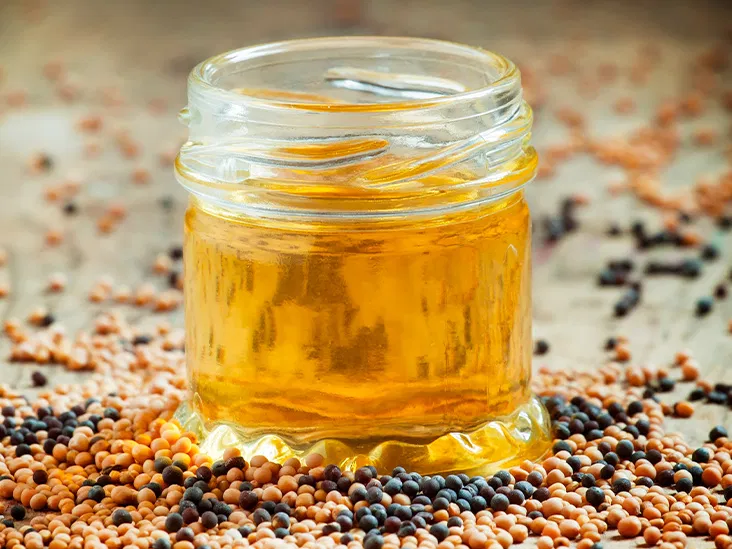When we think of mustard oil, most of us usually associate it with cooking and the flavor it adds to our dishes. However, in recent years, mustard oil has also gained popularity for its wide range of health benefits and its use as a topical oil. While the mustard oil used in cooking and the one used topically may share some similar properties, there are a few key differences between them. In this blog post, we will explore the differences between these two types of mustard oil, as well as their unique health benefits.
Table of Contents
Processing Methods
One of the main differences between cooking mustard oil and topical mustard oil lies in their processing methods. The mustard oil used in cooking is usually made by cold-pressing the seeds of the mustard plant. This process helps to retain the natural flavor and aroma of the oil, which makes it ideal for cooking purposes. Topical mustard oil, on the other hand, is generally processed by steam distillation or solvent extraction. This removes any impurities from the oil and enhances its therapeutic properties, making it more suitable for external use.
Nutritional Value
Mustard oil used in cooking is an excellent source of essential fatty acids and antioxidants, making it highly beneficial for health. It contains high levels of omega-3 and omega-6 fatty acids, which can help reduce inflammation, improve heart health, and boost brain function. In contrast, topical mustard oil has a relatively lower nutritional value but is rich in compounds like glucosinolates and isothiocyanates. These compounds have powerful antioxidant and anti-inflammatory properties, which can help to soothe irritated skin, reduce inflammation, and promote wound healing.
Health Benefits
The health benefits of cooking mustard oil and topical mustard oil also differ significantly. Cooking mustard oil has been found to have numerous health benefits, including reducing the risk of cardiovascular disease, improving digestion, and boosting immunity. Topical mustard oil, on the other hand, can help alleviate a wide range of skin conditions such as eczema, psoriasis, and acne. It can also help relieve pain and stiffness associated with arthritis, reduce muscle soreness, and improve respiratory health.
Why Mustard oil is better than Vegetable Oils
Aside from the differences between cooking mustard oil and topical mustard oil, there remains a debate over whether mustard oil is better than vegetable oils. While both are popular cooking oils, mustard oil may be a better choice for several reasons. First, it has a lower percentage of saturated fat than most vegetable oils. High levels of saturated fat can contribute to heart disease, so switching to mustard oil can offer a healthier option. Additionally, mustard oil has a high smoke point, meaning it can withstand high temperatures without breaking down into unhealthy compounds. This makes it ideal for deep-frying or sautéing foods. Lastly, mustard oil contains compounds like erucic acid and glucosinolates that have been shown to have anti-cancer properties. This makes it a healthier choice for overall wellness.
Mustard oil vs Ghee: Which is more Healthier for Cooking
Apart from the ongoing debate between mustard oil and vegetable oils, there is also a discussion about whether mustard oil or ghee is a healthier option for cooking. Ghee is a type of clarified butter that is commonly used in Indian cuisine and is known for its rich flavor. When compared to mustard oil, ghee has a lower smoke point and is high in saturated fat. This means that it may not be the best choice for deep-frying or sautéing foods. On the other hand, mustard oil has a higher smoke point, making it ideal for cooking at high temperatures. Additionally, mustard oil has been found to have various health benefits, including reducing the risk of cardiovascular disease and improving digestion. Ghee, on the other hand, is a good source of vitamin A and has anti-inflammatory properties. In conclusion, while both mustard oil and ghee have their unique health benefits, mustard oil may be a better choice for cooking due to its higher smoke point and lower levels of saturated fat.
What is the advantage of mustard oil on body?
In addition to its health benefits, mustard oil also has several advantages for the body when applied topically. It can improve blood circulation and stimulate the sweat glands, promoting detoxification and flushing out toxins from the body. It can also improve hair growth and prevent hair loss by nourishing the scalp and hair follicles. Regular use of mustard oil on the skin can help keep it soft, supple, and moisturized, improving overall skin health. It can also act as a natural insect repellent and prevent insect bites by applying it to exposed skin. Overall, using mustard oil can provide both internal and external benefits to the body.
Conclusion
Mustard oil is a versatile oil that can be used for both cooking and topical applications. While there are differences between the two, both forms of mustard oil offer unique health benefits. Cooking mustard oil is an excellent source of essential fatty acids and has numerous health benefits, while topical mustard oil contains powerful compounds that can soothe and heal the skin. Ultimately, choosing mustard oil over vegetable oils can offer a healthier option for cooking and overall wellness.

